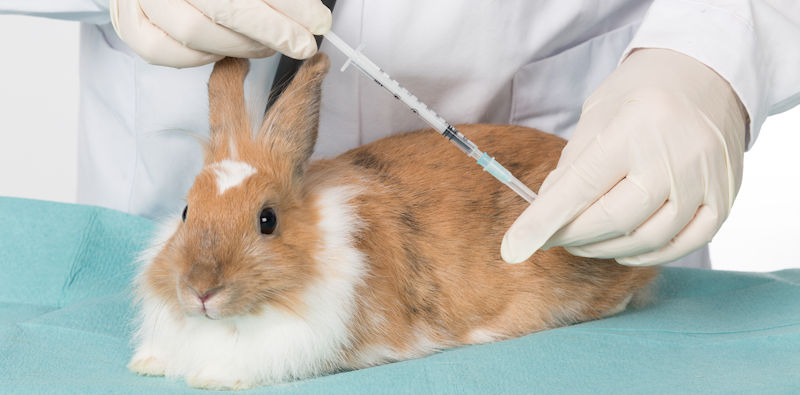Myxomatosis
Myxomatosis is spread by biting insects. It takes just one flea or one mosquito to infect a rabbit. Whilst mosquitoes can be spotted with a little vigilance, fleas are difficult to detect.
It's often forgotten that fleas spend about 95% of their time NOT on their host animal, so by the time they are detected on the animal it is likely an infestation is already taking place and fleas have been present in your environment for a good while.
RHD1, RHD2
The RHD diseases (Both variant 1 and variant 2) are spread both by direct and indirect contact - for example, through contact with droppings from an infected rabbit, or transfer from earlier contact such as transfer on shoes, clothes, from flies and fleas or other animals such as a rodent, fox or even human. They are diseases that are almost impossible to control against.
Because There's No Cure
Each of these three diseases will most likely kill an unvaccinated rabbit, and although a vaccinated rabbit can, in rare occasions, also succumb to the disease, vaccination is the ONLY known defence and offers the rabbit a fighting chance to survive should any of these diseases be contracted after vaccination.
As knowledge of these diseases increases, and vaccines improve, your vet may offer a combined vaccine which covers more than one of these diseases in a single vaccination.
Check With Your Vet
Please check with your vet exactly which diseases have been included within the vaccine as there is still some confusion over RHD1 and RHD2. A vaccine for each of these diseases is required; the single vaccine for RHD1, for example is NOT effective against RHD2.
Many veterinary practices offer an annual health package for a fixed monthly fee. This usually includes vaccinations, health checks and occasionally other items, such as nail clipping, for example. Please check with your vet to find out exactly which vaccines are included in the plan, as they may not include all three.
Going On Holiday?
It’s worth noting here that should you plan to take your rabbits to a boarding facility when you are on holiday, reputable boarding companies will insist on seeing the vaccination records for all three diseases above. A vaccination record can be obtained free of charge from your vet.
Good For The Young Too!
Vaccinations can be carried out on rabbits from 6 weeks of age. Your vet should carry out a health check to ensure all is well before injecting and confirm your rabbit is not pregnant first.
Side Effects?
Whilst most rabbits show no ill-effect to vaccination, it is not uncommon for a localised skin reaction to appear (a lump in the case of myxomatosis), and you should check with your vet if you see any reaction of have any concerns over the behaviour or health of your rabbits after the vaccination.
Further Reading
Check out our other info pages for more information on the diseases themselves.
|


